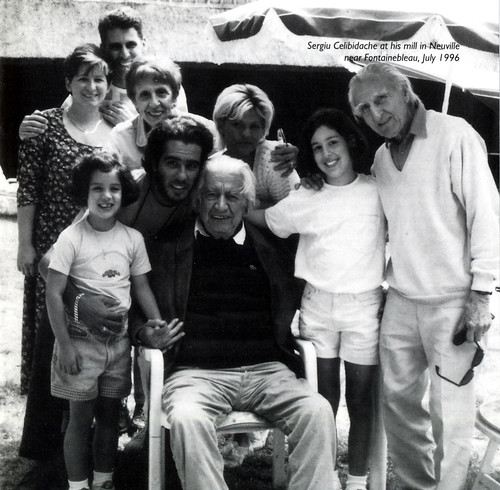Via Flickr:
28 iunie 1912 – 14 august 1996
// You can't do anything other than let it happen. You just let it evolve. You don't do anything yourself. All you do is make sure that nothing disturbs this wonderful creation in any way. You are extremely active and at the same time extremely passive. You don't do anything; you just let it evolve.
// A rehearsal is not music. A rehearsal is the sum of uncountable 'nos'. 'Not too far, not too loud, not above the bassoon, not so dull.' How many 'nos' are there? Billions. And how many 'yeses'? Just one.
// That is the complete training. You have to do at your seats what I am doing at mine. You have to conduct with me. We react spontaneously to what we hear, that is, functionally, as is necessary. Not "this is marked piano, this is marked forte…" - no one is interested in that.
// I don't know if that gives you an idea of what I would like: to emanate from what already exists. The way oil spreads, becoming wider and wider and wider. Not so pointed. Those are notes, but not yet music.
// What is the "interpretation" in what we are doing here? It's nothing else but finding out what the composer had in mind. He starts from an experience and looks for the notes. We start with the notes to come to his experience.
// When I criticize him like this he is losing his spontaneity. He will have to find reality by himself. Reality which cannot be 'interpreted'. There are facts that exist even when we don't see them. The whole morning we did nothing but try to find this reality behind the notes. We never said: "You have to do it like this!" Instead: You have to discover what exists, beyond ourselves. I could explain to him: "The phrase is like this", and he would imitate Celibidache. - I insist that he himself finds out that he went beyond the notes without making them his own, without humanizing them.
// What is the sense of a musical phrase? 'Tata hee hoo hii doo pff' Why is this senseless? Because the beginning has no relation to the end. A sequence of tones follows a structure which finally connects the beginning with the end. When do I know that a piece has come to its end? I know it when the end is in the beginning. When the end keeps what the beginning promised. Continuity doesn't mean: to go from one moment to the next, but: after going through many moments to experience timelessness. That is where beginning and end live together: in the now. What is required to experience any structure as a whole? The absolute interrelation between the individual parts. When I don't feel the parts but the whole, what did my mind do? Integrate.
// What did I learn from Furtwängler? One idea which opened all doors for my whole life and for all my studies: When the young Celibidache asked him: "Maestro, this transition in this Bruckner-symphony - how fast is it? What do you beat there?" "What do you mean by 'how fast'? he replied. It depends on what it sounds like! When it sounds rich and deep I get slower, when it sounds dry and brittle I have to get faster." He adjusts according to what he actually hears! According to the actual result, and not to a theory! "92 beats per minute." - What does '92' mean in the Berlin Philharmonic, and what does it mean in Munich or in Vienna? What nonsense! Each concerthall, each piece and each movement has its individual tempo which represents a unique situation.
// Something starts to move, but you don't notice that it is moving in time. If anyone has the feeling it is either too long or too short, he is already out of the music. Here you can somehow live beyond time. In this sense music has no duration in time. In any normal concert you are out of it all the time. In a hundred concerts a year, if there are three where you somehow stayed with it - that would be a lot.
Traducere // Translate
Celibidache cu familia
Abonați-vă la:
Postare comentarii (Atom)

Niciun comentariu:
Trimiteți un comentariu